
List of United States Senators from North Carolina
Encyclopedia
North Carolina
ratified the Constitution on November 21, 1789, after the beginning of the 1st Congress
. Its current senators are Democrat Kay Hagan and Republican Richard Burr
.
belong to the electoral cycle that were elected for two Congresses in the first election of 1788/1789 and whose seats in recent years are contested in 1996
, 2002
, 2008
, and will be contested in 2014.
belong to the electoral cycle that were elected for three Congresses in the first election of 1788/1789 and whose seats in recent years are contested in 1992
, 1998
, 2004
, 2010
, and will be contested in 2016.
North Carolina
North Carolina is a state located in the southeastern United States. The state borders South Carolina and Georgia to the south, Tennessee to the west and Virginia to the north. North Carolina contains 100 counties. Its capital is Raleigh, and its largest city is Charlotte...
ratified the Constitution on November 21, 1789, after the beginning of the 1st Congress
1st United States Congress
-House of Representatives:During this congress, five House seats were added for North Carolina and one House seat was added for Rhode Island when they ratified the Constitution.-Senate:* President: John Adams * President pro tempore: John Langdon...
. Its current senators are Democrat Kay Hagan and Republican Richard Burr
Richard Burr
Richard Mauze Burr is the senior United States Senator from North Carolina and a member of the Republican Party. Previously, Burr represented North Carolina's 5th congressional district in the United States House of Representatives....
.
Class 2
Class 2 U.S. SenatorsClasses of United States Senators
The three classes of United States Senators are currently made up of 33 or 34 Senate seats. The purpose of the classes is to determine which Senate seats will be up for election in a given year. The three groups are staggered so that one of them is up for election every two years.A senator's...
belong to the electoral cycle that were elected for two Congresses in the first election of 1788/1789 and whose seats in recent years are contested in 1996
United States Senate election in North Carolina, 1996
The North Carolina United States Senate election of 1996 was held on 5 November 1996 as part of the nation-wide elections to the Senate, and coinciding with the 1996 presidential election. The general election was a rematch of the 1990 election: between the Republican incumbent Jesse Helms and the...
, 2002
United States Senate election in North Carolina, 2002
The 2002 United States Senate election in North Carolina was held on November 5, 2002. Incumbent Republican U.S. Senator Jesse Helms decided to retire due to health reasons. Republican Elizabeth Dole won the open seat.-Candidates:...
, 2008
United States Senate election in North Carolina, 2008
The 2008 United States Senate election in North Carolina was held on November 4, 2008. The Senate election coincided with the presidential, U.S. House elections, gubernatorial, Council of State, and statewide judicial elections. Incumbent Republican U.S. Senator Elizabeth Dole ran for re-election...
, and will be contested in 2014.
| # | Senator | Party | Years | Congress | Term | Electoral history |
|---|---|---|---|---|---|---|
| 1 | 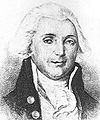 Samuel Johnston Samuel JohnstonSamuel Johnston Samuel Johnston was an American planter, lawyer, and statesman from Chowan County, North Carolina. He represented North Carolina in both the Continental Congress and the United States Senate, and was the sixth Governor of North Carolina.-Early Life and Revolutionary Politics:Johnston was born in... |
Pro- Administration |
November 27, 1789 – March 4, 1793 |
1 1st United States Congress -House of Representatives:During this congress, five House seats were added for North Carolina and one House seat was added for Rhode Island when they ratified the Constitution.-Senate:* President: John Adams * President pro tempore: John Langdon... |
1 | Elected in 1789 |
| 2 2nd United States Congress -House of Representatives:During this congress, two new House seats were added for each of the new states of Vermont and Kentucky. -Leadership:-Senate:*President: John Adams *President pro tempore:** Richard Henry Lee... |
||||||
| 2 |  Alexander Martin Alexander MartinAlexander Martin Alexander Martin was the fourth and seventh Governor of the U.S. state of North Carolina from 1782 to 1784 and from 1789 to 1792.-Biography:... |
Anti- Administration |
March 4, 1793 – March 4, 1799 |
3 3rd United States Congress The Third United States Congress was a meeting of the legislative branch of the United States federal government, consisting of the United States Senate and the United States House of Representatives... |
2 | Elected in 1793 Lost re-election |
| Democratic- Republican |
4 4th United States Congress -House of Representatives:- Senate :* President: John Adams * President pro tempore:** Henry Tazewell , first elected December 7, 1795** Samuel Livermore , first elected May 6, 1796** William Bingham , first elected February 16, 1797... |
|||||
| 5 5th United States Congress The Fifth United States Congress was a meeting of the legislative branch of the United States federal government, consisting of the United States Senate and the United States House of Representatives... |
||||||
| 3 |  Jesse Franklin Jesse FranklinJesse Franklin Jesse Franklin was the Democratic-Republican U.S. senator from the U.S. state of North Carolina between 1799 and 1805 and between 1807 and 1813. He later served as the 20th Governor of North Carolina from 1820 to 1821.... |
Democratic- Republican |
March 4, 1799 – March 4, 1805 |
6 6th United States Congress The Sixth United States Congress was a meeting of the legislative branch of the United States federal government, consisting of the United States Senate and the United States House of Representatives. It met at Congress Hall in Philadelphia, Pennsylvania and in Washington, D.C. from March 4, 1799... |
3 | Elected in 1799 Lost re-election |
| 7 7th United States Congress - House of Representatives :-Senate:* President: Aaron Burr * President pro tempore:** Abraham Baldwin , first elected December 7, 1801** Stephen R. Bradley , first elected December 14, 1802-House of Representatives:... |
||||||
| 8 8th United States Congress - Senate :* President: Aaron Burr * President pro tempore: John Brown , October 17, 1803 – February 26, 1804** Jesse Franklin , March 10, 1804 – November 4, 1804** Joseph Anderson , January 15, 1805 – December 1, 1805- House of Representatives :... |
||||||
| 4 | 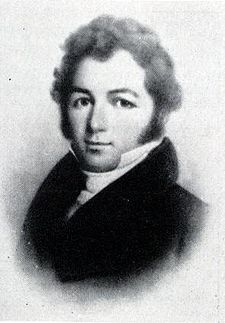 James Turner James TurnerJames Turner James Turner was the 12th Governor of the U.S. state of North Carolina from 1802 to 1805. He later served as a U.S. senator between 1805 and 1816.... |
Democratic- Republican |
March 4, 1805 – November 21, 1816 |
9 9th United States Congress - Senate :* President: George Clinton * President pro tempore: Samuel Smith - House of Representatives :* Speaker: Nathaniel Macon -Members:This list is arranged by chamber, then by state... |
4 | Elected in 1804 United States Senate elections, 1804 The United States Senate election of 1804 was an election which expanded the Democratic-Republican Party's overwhelming control over the United States Senate.... |
| 10 10th United States Congress - House of Representatives :- Senate :*President: George Clinton *President pro tempore: Samuel Smith , elected April 16, 1808** Stephen R. Bradley , elected December 28, 1808** John Milledge , elected January 30, 1809... |
||||||
| 11 11th United States Congress - House of Representatives :-Leadership:- Senate :* President: George Clinton * President pro tempore:** John Milledge ** Andrew Gregg , elected June 26, 1809** John Gaillard , elected February 28, 1810... |
||||||
| 12 12th United States Congress - House of Representatives :During this congress, one new House seat was added for the new state of Louisiana.- Senate :*President: George Clinton *President pro tempore: William H. Crawford -House of Representatives:*Speaker: Henry Clay... |
5 | Re-elected in 1810 United States Senate elections, 1810 The United States Senate election of 1810 was an election which had the Democratic-Republican Party increase its overwhelming control of the Senate to a five-sixths majority by gaining three additional Senators.... Resigned due to ill health |
||||
| 13 13th United States Congress - Senate :* President: Elbridge Gerry , until November 23, 1814, thereafter vacant.* President pro tempore: Joseph B. Varnum , December 6, 1813 – February 3, 1814** John Gaillard , elected November 25, 1814- House of Representatives :... |
||||||
| 14 14th United States Congress - Senate :* President: Vacant* President pro tempore: John Gaillard of South Carolina, first elected December 4, 1815- House of Representatives :* Speaker: Henry Clay of Kentucky-Members:This list is arranged by chamber, then by state... |
||||||
| Vacant | November 21, 1816 – December 4, 1816 |
|||||
| 5 | 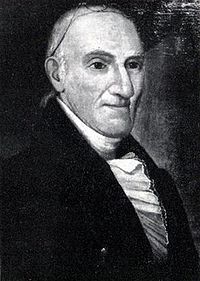 Montfort Stokes Montfort StokesMontfort Stokes Montfort Stokes was an American Democratic politician who served as U.S. Senator from 1816 to 1823, and the 25th Governor of North Carolina from 1830 to 1832.... |
Democratic- Republican |
December 4, 1816 – March 4, 1823 |
Elected to finish Turner's term | ||
| 15 15th United States Congress -Leadership:- Senate :* President: Daniel D. Tompkins * President pro tempore:** John Gaillard , elected March 4, 1817** James Barbour , elected February 15, 1819- House of Representatives :*Speaker: Henry Clay -Members:... |
6 | Elected to full term in 1816 United States Senate elections, 1816 The United States Senate election of 1816 was an election for the United States Senate which had the Democratic-Republican Party gain four seats, and which coincided with the Presidential election.... |
||||
| 16 16th United States Congress -House of Representatives:During this congress, one House seat was added for the new state of Alabama and one seat was reapportioned from Massachusetts to the new state of Maine. For the beginning of the next congress, six more seats from Massachusetts would be reapportioned to... |
||||||
| 17 17th United States Congress The Seventeenth United States Congress was a meeting of the legislative branch of the United States federal government, consisting of the United States Senate and the United States House of Representatives. It met in Washington, D.C. from March 4, 1821 to March 3, 1823, during the fifth and sixth... |
||||||
| 6 |  John Branch John BranchJohn Branch John Branch, Jr. served as U.S. Senator, Secretary of the Navy, the 19th Governor of the state of North Carolina, and was the sixth and last territorial governor of Florida.... |
Crawford Republican |
March 4, 1823 – March 9, 1829 |
18 18th United States Congress The Eighteenth United States Congress was a meeting of the legislative branch of the United States federal government, consisting of the United States Senate and the United States House of Representatives. It met in Washington, D.C. from March 4, 1823 to March 3, 1825, during the seventh and eighth... |
7 | Elected in 1822 United States Senate elections, 1822 The United States Senate election of 1822 was an election for the United States Senate which saw the Democratic-Republican Party retain a majority over the National Republican and Federalist parties.... |
| Jacksonian | 19 19th United States Congress -House of Representatives:-Leadership:- Senate :* President: John C. Calhoun * President pro tempore: John Gaillard , until December 4, 1825** Nathaniel Macon , from May 20, 1826- House of Representatives :* Speaker: John W. Taylor -Members:... |
|||||
| 20 20th United States Congress -House of Representatives:-Leadership:- Senate :* President: John C. Calhoun * President pro tempore: Samuel Smith - House of Representatives :* Speaker: Andrew Stevenson -Members:This list is arranged by chamber, then by state... |
||||||
| 21 21st United States Congress -House of Representatives:-Leadership:- Senate :* President: John C. Calhoun * President pro tempore: Samuel Smith - House of Representatives :* Speaker: Andrew Stevenson -Members:This list is arranged by chamber, then by state... |
8 | Re-elected in 1828 United States Senate elections, 1828 The United States Senate election of 1828 was an election which had the Jacksonian coalition, despite its leader's victory in the presidential election, lose two seats in the United States Senate to the opposing Anti-Jackson coalition.... Resigned to become U.S. Secretary of the Navy United States Secretary of the Navy The Secretary of the Navy of the United States of America is the head of the Department of the Navy, a component organization of the Department of Defense... |
||||
| Vacant | March 9, 1829 – December 9, 1829 |
|||||
| 7 | 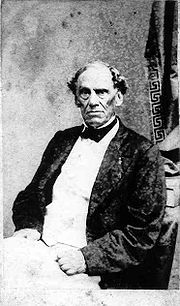 Bedford Brown Bedford BrownBedford Brown Bedford Brown was a Democratic United States Senator from the State of North Carolina between 1829 and 1840. was born in what now is , Caswell County, North Carolina. His parents were Jethro Brown and Lucy Williamson Brown. After attending the University of North Carolina for one year, Brown was... |
Democratic | December 9, 1829 – November 16, 1840 |
21 21st United States Congress -House of Representatives:-Leadership:- Senate :* President: John C. Calhoun * President pro tempore: Samuel Smith - House of Representatives :* Speaker: Andrew Stevenson -Members:This list is arranged by chamber, then by state... (Continued) |
Elected to finish Branch's term | |
| 22 22nd United States Congress -House of Representatives:-Leadership:- Senate :* President:** John C. Calhoun , resigned December 28, 1832, thereafter vacant.* President pro tempore:** Samuel Smith , first elected December 5, 1831** Littleton W... |
||||||
| 23 23rd United States Congress -House of Representatives:For the beginning of this congress, the size of the House was increased from 213 seats to 240 seats, following the 1830 United States Census .- Leadership :- Senate :* President: Martin Van Buren... |
||||||
| 24 24th United States Congress -House of Representatives:During this congress one House seat was added for each of the new states of Arkansas and Michigan.-Leadership:- Senate :* President: Martin Van Buren * President pro tempore: William R. King - House of Representatives :... |
9 | Re-elected in 1835 Resigned |
||||
| 25 25th United States Congress -House of Representatives:-Leadership:- Senate :* President: Richard Mentor Johnson * President pro tempore: William R. King - House of Representatives :* Speaker: James K. Polk -Members:This list is arranged by chamber, then by state... |
||||||
| 26 26th United States Congress -House of Representatives:- Leadership :- Senate :*President: Richard M. Johnson *President pro tempore: William R. King - House of Representatives :*Speaker: Robert M.T. Hunter -Members:This list is arranged by chamber, then by state... |
||||||
| Vacant | November 16, 1840 – November 25, 1840 |
|||||
| 8 | 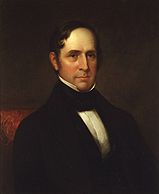 Willie Mangum Willie MangumWillie Person Mangum Willie Person Mangum was a U.S. Senator from the state of North Carolina between 1831 and 1836 and between 1840 and 1853. He was one of the founders and leading members of the Whig party, and was a candidate for President on a Whig ticket in 1836.Mangum was born in Durham County, North Carolina... |
Whig | November 25, 1840 – March 4, 1853 |
26 26th United States Congress -House of Representatives:- Leadership :- Senate :*President: Richard M. Johnson *President pro tempore: William R. King - House of Representatives :*Speaker: Robert M.T. Hunter -Members:This list is arranged by chamber, then by state... (Continued) |
Elected to finish Brown's term | |
| 27 27th United States Congress The Twenty-seventh United States Congress was a meeting of the legislative branch of the United States federal government, consisting of the United States Senate and the United States House of Representatives. It met in Washington, D.C. from March 4, 1841 to March 3, 1843, during the one-month... |
10 | Elected in 1841 | ||||
| 28 28th United States Congress -House of Representatives:Following the 1840 United States Census, Congress reapportioned the House to include 223 seats . During this congress, one House seat was added for the new state of Florida .- Senate :*President: Vacant... |
||||||
| 29 29th United States Congress -House of Representatives:During this congress, two House seats were added for each of the new states of Texas and Iowa.-Leadership:-Senate:* President: George M. Dallas * President pro tempore: Willie P. Mangum... |
||||||
| 30 30th United States Congress The Thirtieth United States Congress was a meeting of the legislative branch of the United States federal government, consisting of the United States Senate and the United States House of Representatives. It met in Washington, D.C. from March 4, 1847 to March 3, 1849, during the last two years of... |
11 | Re-elected in 1847 Lost re-election |
||||
| 31 31st United States Congress The Thirty-first United States Congress was a meeting of the legislative branch of the United States federal government, consisting of the United States Senate and the United States House of Representatives. It met in Washington, D.C. from March 4, 1849 to March 3, 1851, during the last 17 months... |
||||||
| 32 32nd United States Congress The Thirty-second United States Congress was a meeting of the legislative branch of the United States federal government, consisting of the United States Senate and the United States House of Representatives. It met in Washington, D.C. from March 4, 1851 to March 3, 1853, during the third and... |
||||||
| Vacant | March 4, 1853 – December 6, 1854 |
33 33rd United States Congress The Thirty-third United States Congress was a meeting of the legislative branch of the United States federal government, consisting of the United States Senate and the United States House of Representatives. It met in Washington, D.C. from March 4, 1853 to March 3, 1855, during the first two years... |
12 | Legislature failed to elect | ||
| 9 | 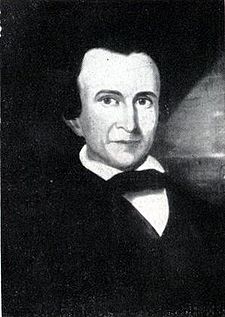 David Reid David ReidDavid Settle Reid David Settle Reid was the 32nd Governor of the U.S. state of North Carolina from 1851 to 1854 and a U.S. Senator from December 1854 to March 1859. His uncle was Congressman Thomas Settle, and his brother was Hugh Kearns Reid.... |
Democratic | December 6, 1854 – March 4, 1859 |
33 33rd United States Congress The Thirty-third United States Congress was a meeting of the legislative branch of the United States federal government, consisting of the United States Senate and the United States House of Representatives. It met in Washington, D.C. from March 4, 1853 to March 3, 1855, during the first two years... (Continued) |
Elected to finish vacant term Lost re-election |
|
| 34 34th United States Congress The Thirty-fourth United States Congress was a meeting of the legislative branch of the United States federal government, consisting of the United States Senate and the United States House of Representatives. It met in Washington, D.C. from March 4, 1855 to March 4, 1857, during the last two years... |
||||||
| 35 35th United States Congress The 35th United States Congress was a meeting of the legislative branch of the United States federal government, consisting of the United States Senate and the United States House of Representatives. It met in Washington, D.C. from March 4, 1857 to March 3, 1859, during the first two years of James... |
||||||
| 10 | Thomas Bragg Thomas Bragg Thomas Bragg was a politician and lawyer who served as the 34th Governor of the U.S. state of North Carolina from 1855 through 1859. During the Civil War, he served in the Confederate States Cabinet. He was the older brother of General Braxton Bragg... |
Democratic | March 4, 1859 – July 11, 1861 |
36 36th United States Congress The Thirty-sixth United States Congress was a meeting of the legislative branch of the United States federal government, consisting of the United States Senate and the United States House of Representatives. It met in Washington, D.C. from March 4, 1859 to March 4, 1861, during the third and fourth... |
13 | Elected in 1858 United States Senate elections, 1858 The United States Senate election of 1858 was an election which had the Republican Party gain six additional seats in the United States Senate.As this election was prior to ratification of the seventeenth amendment, Senators were chosen by State legislatures.... Expelled |
| 37 37th United States Congress The Thirty-seventh United States Congress was a meeting of the legislative branch of the United States federal government, consisting of the United States Senate and the United States House of Representatives. It met in Washington, D.C. from March 4, 1861 to March 4, 1863, during the first two... |
||||||
| Vacant | July 11, 1861 – July 14, 1868 |
37 37th United States Congress The Thirty-seventh United States Congress was a meeting of the legislative branch of the United States federal government, consisting of the United States Senate and the United States House of Representatives. It met in Washington, D.C. from March 4, 1861 to March 4, 1863, during the first two... (Continued) |
Civil War American Civil War The American Civil War was a civil war fought in the United States of America. In response to the election of Abraham Lincoln as President of the United States, 11 southern slave states declared their secession from the United States and formed the Confederate States of America ; the other 25... and Reconstruction |
|||
| 38 38th United States Congress -House of Representatives:Before this Congress, the 1860 United States Census and resulting reapportionment changed the size of the House to 241 members... |
||||||
| 39 39th United States Congress The Thirty-ninth United States Congress was a meeting of the legislative branch of the United States federal government, consisting of the United States Senate and the United States House of Representatives. It met in Washington, D.C. from March 4, 1865 to March 4, 1867, during the first month of... |
14 | |||||
| 40 40th United States Congress The Fortieth United States Congress was a meeting of the legislative branch of the United States federal government, consisting of the United States Senate and the United States House of Representatives. It met in Washington, D.C. from March 4, 1867 to March 4, 1869, during the third and fourth... |
||||||
| 11 | 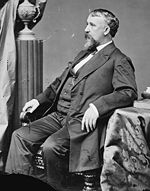 Joseph Abbott Joseph AbbottJoseph Carter Abbott Joseph Carter Abbott was a Union Army colonel during the American Civil War who was awarded the grade of brevet brigadier general of volunteers and a Republican United States Senator from the state of North Carolina between 1868 and 1871. During his career in private life he was a lawyer,... |
Republican | July 14, 1868 – March 4, 1871 |
40 40th United States Congress The Fortieth United States Congress was a meeting of the legislative branch of the United States federal government, consisting of the United States Senate and the United States House of Representatives. It met in Washington, D.C. from March 4, 1867 to March 4, 1869, during the third and fourth... (Continued) |
Elected in 1868 United States Senate elections, 1868 The United States Senate election of 1868 was an election which had the Republican Party gain five seats in the United States Senate, enlarging their already overwhelming majority.... to finish vacant term Lost renomination |
|
| 41 41st United States Congress -House of Representatives:- Senate :* President : Schuyler Colfax* President pro tempore: Henry B. Anthony - House of Representatives :* Speaker: James G. Blaine -Members:This list is arranged by chamber, then by state... |
||||||
| Vacant | March 4, 1871 – January 30, 1872 |
42 42nd United States Congress The Forty-second United States Congress was a meeting of the legislative branch of the United States federal government, consisting of the United States Senate and the United States House of Representatives. It met in Washington, D.C. from March 4, 1871 to March 3, 1873, during the third and fourth... |
15 | Legislature failed to elect | ||
| 12 | 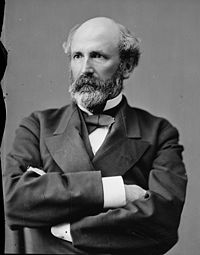 Matt W. Ransom Matt W. Ransom |
Democratic | January 30, 1872 – March 4, 1895 |
42 42nd United States Congress The Forty-second United States Congress was a meeting of the legislative branch of the United States federal government, consisting of the United States Senate and the United States House of Representatives. It met in Washington, D.C. from March 4, 1871 to March 3, 1873, during the third and fourth... (Continued) |
Elected to finish vacant term | |
| 43 43rd United States Congress The Forty-third United States Congress was a meeting of the legislative branch of the United States federal government, consisting of the United States Senate and the United States House of Representatives. It met in Washington, D.C. from March 4, 1873 to March 4, 1875, during the fifth and sixth... |
||||||
| 44 44th United States Congress The Forty-fourth United States Congress was a meeting of the legislative branch of the United States federal government, consisting of the United States Senate and the United States House of Representatives. It met in Washington, D.C. from March 4, 1875 to March 4, 1877, during the seventh and... |
||||||
| 45 45th United States Congress -House of Representatives:-Leadership:-Senate:*President: William A. Wheeler *President pro tempore: Thomas W. Ferry -House of Representatives:*Speaker: Samuel J. Randall -Members:This list is arranged by chamber, then by state... |
16 | Re-elected in 1876 United States Senate elections, 1876 The United States Senate election of 1876 was an election which had the Democratic Party gain three seats in the United States Senate, and which coincided with Rutherford B... |
||||
| 46 46th United States Congress The Forty-sixth United States Congress was a meeting of the legislative branch of the United States federal government, consisting of the United States Senate and the United States House of Representatives. It met in Washington, D.C. from March 4, 1879 to March 4, 1881, during the last two years of... |
||||||
| 47 47th United States Congress The Forty-seventh United States Congress was a meeting of the legislative branch of the United States federal government, consisting of the United States Senate and the United States House of Representatives. It met in Washington, D.C. from March 4, 1881 to March 4, 1883, during the administration... |
||||||
| 48 48th United States Congress The Forty-eighth United States Congress was a meeting of the legislative branch of the United States federal government, consisting of the United States Senate and the United States House of Representatives. It met in Washington, D.C. from March 4, 1883 to March 4, 1885, during the last two years... |
17 | Re-elected in 1883 | ||||
| 49 49th United States Congress The Forty-ninth United States Congress was a meeting of the legislative branch of the United States federal government, consisting of the United States Senate and the United States House of Representatives. It met in Washington, D.C. from March 4, 1885 to March 4, 1887, during the first two years... |
||||||
| 50 50th United States Congress The Fiftieth United States Congress was a meeting of the legislative branch of the United States federal government, consisting of the United States Senate and the United States House of Representatives. It met in Washington, D.C. from March 4, 1887 to March 4, 1889, during the third and fourth... |
||||||
| 51 51st United States Congress The Fifty-first United States Congress, referred to by some critics as the Billion Dollar Congress, was a meeting of the legislative branch of the United States federal government, consisting of the United States Senate and the United States House of Representatives. It met in Washington, D.C... |
18 | Re-elected in 1889 Lost re-election |
||||
| 52 52nd United States Congress The Fifty-second United States Congress was a meeting of the legislative branch of the United States federal government, consisting of the United States Senate and the United States House of Representatives. It met in Washington, D.C... |
||||||
| 53 53rd United States Congress The Fifty-third United States Congress was a meeting of the legislative branch of the United States federal government, consisting of the United States Senate and the United States House of Representatives. It met in Washington, D.C. from March 4, 1893 to March 4, 1895, during the fifth and sixth... |
||||||
| 13 | 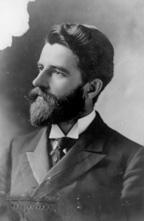 Marion Butler Marion ButlerMarion Butler Marion Butler was a Populist U.S. senator from the state of North Carolina between 1895 and 1901.-Early life:Butler was born in rural Sampson County, North Carolina during the American Civil War. He was a graduate of the University of North Carolina, where he was a member of the Philanthropic... |
Populist | March 4, 1895 – March 4, 1901 |
54 54th United States Congress - House of Representatives :-Leadership:- Senate :* President: Adlai E. Stevenson * President pro tempore: William P. Frye - Majority leadership :* Republican Conference Chairman: John Sherman- Minority leadership :... |
19 | Elected in 1894 Lost re-election |
| 55 55th United States Congress -House of Representatives:* Republican: 206 * Democratic: 124* Populist: 22* Silver Republican: 3* Silver: 1* Independent Republican: 1TOTAL members: 357-Leadership:-Senate:* President: Garret Hobart * President pro tempore: William P... |
||||||
| 56 56th United States Congress -House of Representatives:- Leadership :- Senate :* President: Garret Hobart , until November 21, 1899 , vacant thereafter.* President pro tempore: William P. Frye * Democratic Caucus Chairman: James K. Jones... |
||||||
| 14 | 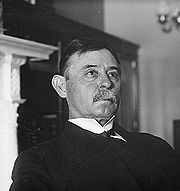 Furnifold M. Simmons Furnifold M. Simmons |
Democratic | March 4, 1901 – March 4, 1931 |
57 57th United States Congress -House of Representatives:*Democratic: 151*Republican: 200 *Populist: 5*Silver : 1TOTAL members: 357-Leadership:-Senate:* President: Theodore Roosevelt , until September 14, 1901, vacant thereafter.... |
20 | Elected in 1900 United States Senate elections, 1900 The United States Senate election of 1900 was an election which had the Republican Party gain three seats in the United States Senate, and which corresponded with President William McKinley's landslide re-election.... |
| 58 58th United States Congress - House of Representatives :* Republican : 209 * Democratic : 176* Silver Republican : 1TOTAL members: 386-Senate:* President: Vacant* President pro tempore: William P. Frye -Members:... |
||||||
| 59 59th United States Congress The Fifty-ninth United States Congress was a meeting of the legislative branch of the United States federal government, composed of the United States Senate and the United States House of Representatives. It met in Washington, DC from March 4, 1905 to March 4, 1907, during the fifth and sixth... |
||||||
| 60 60th United States Congress The Sixtieth United States Congress was a meeting of the legislative branch of the United States federal government, composed of the United States Senate and the United States House of Representatives. It met in Washington, DC from March 4, 1907 to March 4, 1909, during the last two years of... |
21 | Re-elected in 1906 United States Senate elections, 1906 The United States Senate election of 1906 was an election which had the Republican Party gain three seats in the United States Senate, expanding their majority to almost twice that of the opposing Democratic Party.... |
||||
| 61 61st United States Congress The Sixty-first United States Congress was a meeting of the legislative branch of the United States federal government, composed of the United States Senate and the United States House of Representatives. It met in Washington, DC from March 4, 1909 to March 4, 1911, during the first two years of... |
||||||
| 62 62nd United States Congress - House of Representatives :* Democratic : 230 * Republican : 162* Socialist : 1* Independent : 1TOTAL members: 394-Senate:* President: James S... |
||||||
| 63 63rd United States Congress - House of Representatives:*Democratic : 291 *Republican : 134*Progressive : 9*Independent : 1TOTAL members: 435-Senate:*President of the Senate: Thomas R. Marshall*President pro tempore: James P. Clarke-Senate:... |
22 | Re-elected in 1912 | ||||
| 64 64th United States Congress The Sixty-fourth United States Congress was a meeting of the legislative branch of the United States federal government, composed of the United States Senate and the United States House of Representatives. It met in Washington, DC from March 4, 1915 to March 4, 1917, during the third and fourth... |
||||||
| 65 65th United States Congress The Sixty-fifth United States Congress was a meeting of the legislative branch of the United States federal government, composed of the United States Senate and the United States House of Representatives. It met in Washington, DC from March 4, 1917 to March 4, 1919, during the fourth and fifth... |
||||||
| 66 66th United States Congress The Sixty-sixth United States Congress was a meeting of the legislative branch of the United States federal government, comprising the United States Senate and the United States House of Representatives. It met in Washington, DC from March 4, 1919 to March 4, 1921, during the last two years of... |
23 | Re-elected in 1918 | ||||
| 67 67th United States Congress The Sixty-seventh United States Congress was a meeting of the legislative branch of the United States federal government, consisting of the United States Senate and the United States House of Representatives. It met in Washington, D.C. from March 4, 1921 to March 4, 1923, during the first two years... |
||||||
| 68 68th United States Congress The Sixty-eighth United States Congress was a meeting of the legislative branch of the United States federal government, consisting of the United States Senate and the United States House of Representatives. It met in Washington, D.C. from March 4, 1923 to March 4, 1925, during the last months of... |
||||||
| 69 69th United States Congress The Sixty-ninth United States Congress was a meeting of the legislative branch of the United States federal government, consisting of the United States Senate and the United States House of Representatives. It met in Washington, D.C. from March 4, 1925 to March 4, 1927, during the third and fourth... |
24 | Re-elected in 1924 Lost renomination |
||||
| 70 70th United States Congress The Seventieth United States Congress was a meeting of the legislative branch of the United States federal government, consisting of the United States Senate and the United States House of Representatives. It met in Washington, D.C. from March 4, 1927 to March 3, 1929, during the last two years of... |
||||||
| 71 71st United States Congress The Seventy-first United States Congress was a meeting of the legislative branch of the United States federal government, consisting of the United States Senate and the United States House of Representatives. It met in Washington, D.C. from March 4, 1929 to March 4, 1931, during the first two years... |
||||||
| 15 | Josiah Bailey | Democratic | March 4, 1931 – December 15, 1946 |
72 72nd United States Congress The Seventy-second United States Congress was a meeting of the legislative branch of the United States federal government, consisting of the United States Senate and the United States House of Representatives. It met in Washington, D.C. from March 4, 1931 to March 4, 1933, during the last two years... |
25 | Elected in 1930 |
| 73 73rd United States Congress The Seventy-third United States Congress was a meeting of the legislative branch of the United States federal government, composed of the United States Senate and the United States House of Representatives. It met in Washington, DC from March 4, 1933 to January 3, 1935, during the first two years... |
||||||
| 74 74th United States Congress -House:Also 2 Delegates, 3 Resident Commissioners-Senate:*President of the Senate: John N. Garner *President pro tempore: Key Pittman -Majority leadership:*Majority leader: Joseph T. Robinson... |
||||||
| 75 75th United States Congress The Seventy-fifth United States Congress was a meeting of the legislative branch of the United States federal government, composed of the United States Senate and the United States House of Representatives. It met in Washington, DC from January 3, 1937 to January 3, 1939, during the first two years... |
26 | Re-elected in 1936 | ||||
| 76 76th United States Congress The Seventy-sixth United States Congress was a meeting of the legislative branch of the United States federal government, composed of the United States Senate and the United States House of Representatives. It met in Washington, DC from January 3, 1939 to January 3, 1941, during the seventh and... |
||||||
| 77 77th United States Congress -Major events:* December 7, 1941: Attack on Pearl Harbor* December 8, 1941: Joint Session of Congress met to hear President Roosevelt deliver his "Day of Infamy" speech... |
||||||
| 78 78th United States Congress The Seventy-eighth United States Congress was a meeting of the legislative branch of the United States federal government, composed of the United States Senate and the United States House of Representatives. It met in Washington, DC from January 3, 1943 to January 3, 1945, during the last two years... |
27 | Re-elected in 1942 Died |
||||
| 79 79th United States Congress The Seventy-ninth United States Congress was a meeting of the legislative branch of the United States federal government, composed of the United States Senate and the United States House of Representatives. It met in Washington, DC from January 3, 1945 to January 3, 1947, during the last months of... |
||||||
| Vacant | December 15, 1946 – December 18, 1946 |
|||||
| 16 | 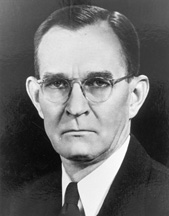 William B. Umstead William B. UmsteadWilliam B. Umstead William Bradley Umstead was an American Senator and the 63rd Governor of the state of North Carolina from 1953 to 1954.-Biography:Umstead was born in the northern Durham County town of Bahama in 1895... |
Democratic | December 18, 1946 – December 30, 1948 |
79 79th United States Congress The Seventy-ninth United States Congress was a meeting of the legislative branch of the United States federal government, composed of the United States Senate and the United States House of Representatives. It met in Washington, DC from January 3, 1945 to January 3, 1947, during the last months of... (Continued) |
Appointed to continue Bailey's term Lost election to finish Bailey's term |
|
| 80 80th United States Congress The Eightieth United States Congress was a meeting of the legislative branch of the United States federal government, composed of the United States Senate and the United States House of Representatives. It met in Washington, DC from January 3, 1947 to January 3, 1949, during the third and fourth... |
||||||
| 17 | J. Melville Broughton J. Melville Broughton Joseph Melville Broughton was the 60th Governor of North Carolina from 1941 to 1945.-Biography:He was born on November 17, 1888 in Raleigh, North Carolina. He attended Harvard Law School then worked as a school principal and journalist before actively entering the legal profession... |
Democratic | December 31, 1948 – March 6, 1949 |
80 80th United States Congress The Eightieth United States Congress was a meeting of the legislative branch of the United States federal government, composed of the United States Senate and the United States House of Representatives. It met in Washington, DC from January 3, 1947 to January 3, 1949, during the third and fourth... (Continued) |
Elected to finish Bailey's term | |
| 81 81st United States Congress The Eighty-first United States Congress was a meeting of the legislative branch of the United States federal government, composed of the United States Senate and the United States House of Representatives... |
28 | Elected to full term in 1948 Died |
||||
| Vacant | March 6, 1949 – March 29, 1949 |
|||||
| 18 | Frank Graham Frank Porter Graham Frank Porter Graham was a president of the University of North Carolina at Chapel Hill and, for a brief period, United States Senator.-Early life:... |
Democratic | March 29, 1949 – November 26, 1950 |
Appointed to continue Broughton's term Lost nomination to finish Broughton's term |
||
| 19 | 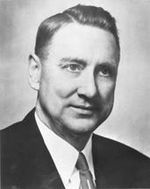 Willis Smith Willis SmithWillis Smith Willis Smith was a Democratic U.S. senator from the state of North Carolina between 1950 and 1953.-Early life and education:Born in Virginia, he moved to North Carolina before age 2... |
Democratic | November 27, 1950 – June 26, 1953 |
82 82nd United States Congress The Eighty-second United States Congress was a meeting of the legislative branch of the United States federal government, composed of the United States Senate and the United States House of Representatives. It met in Washington, DC from January 3, 1951 to January 3, 1953, during the last two years... (Continued) |
Elected to finish Broughton's term Died |
|
| 82 82nd United States Congress The Eighty-second United States Congress was a meeting of the legislative branch of the United States federal government, composed of the United States Senate and the United States House of Representatives. It met in Washington, DC from January 3, 1951 to January 3, 1953, during the last two years... |
||||||
| 83 83rd United States Congress The Eighty-third United States Congress was a meeting of the legislative branch of the United States federal government, composed of the United States Senate and the United States House of Representatives. It met in Washington, DC from January 3, 1953 to January 3, 1955, during the first two years... |
||||||
| Vacant | June 26, 1953 – July 10, 1953 |
|||||
| 20 | Alton A. Lennon | Democratic | July 10, 1953 – November 28, 1954 |
Appointed to continue Smith's term Lost nomination to finish Smith's term |
||
| 21 | 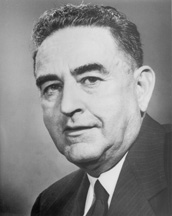 W. Kerr Scott W. Kerr ScottW. Kerr Scott William Kerr Scott was a Democratic Party politician from North Carolina. He was the 62nd Governor of North Carolina from 1949 until 1953 and a United States Senator from 1954 until 1958.-Biography:... |
Democratic | November 29, 1954 – April 16, 1958 |
Elected to finish Smith's term | ||
| 84 84th United States Congress The Eighty-fourth United States Congress was a meeting of the legislative branch of the United States federal government, composed of the United States Senate and the United States House of Representatives. It met in Washington, DC from January 3, 1955 to January 3, 1957, during the third and... |
29 | Elected to full term in 1954 Died |
||||
| 85 85th United States Congress The Eighty-fifth United States Congress was a meeting of the legislative branch of the United States federal government, composed of the United States Senate and the United States House of Representatives. It met in Washington, DC from January 3, 1957 to January 3, 1959, during the fifth and sixth... |
||||||
| Vacant | April 16, 1958 – April 19 1958 |
|||||
| 22 |  B. Everett Jordan B. Everett JordanB. Everett Jordan Benjamin Everett Jordan was a Democratic U.S. Senator from the state of North Carolina from 1958 until 1973. He lived most of his life in Alamance County, North Carolina.... |
Democratic | April 19 1958 – January 3, 1973 |
85 85th United States Congress The Eighty-fifth United States Congress was a meeting of the legislative branch of the United States federal government, composed of the United States Senate and the United States House of Representatives. It met in Washington, DC from January 3, 1957 to January 3, 1959, during the fifth and sixth... (Continued) |
Appointed to continue Scott's term Elected to finish Scott's term |
|
| 86 86th United States Congress The Eighty-sixth United States Congress was a meeting of the legislative branch of the United States federal government, composed of the United States Senate and the United States House of Representatives. It met in Washington, DC from January 3, 1959 to January 3, 1961, during the last two years... |
||||||
| 87 87th United States Congress -House of Representatives :-Senate:* President: Richard Nixon , until January 20, 1961** Lyndon Johnson , from January 20, 1961* President pro tempore: Carl Hayden -House of Representatives:... |
30 | Re-elected in 1960 United States Senate election in North Carolina, 1960 The North Carolina United States Senate election of 1960 was held on 8 November 1960 as part of the nation-wide elections to the Senate. The general election was fought between the Democratic incumbent, B. Everett Jordan, and the Republican nominee, Wilkes County attorney and 1956 Republican... |
||||
| 88 88th United States Congress The Eighty-eighth United States Congress was a meeting of the legislative branch of the United States federal government, composed of the United States Senate and the United States House of Representatives. It met in Washington, DC from January 3, 1963 to January 3, 1965, during the last year of... |
||||||
| 89 89th United States Congress -House of Representatives:- Senate :* President of the Senate: Hubert Humphrey , starting January 20, 1965* President pro tempore: Carl Hayden - Majority leadership :* Majority Leader and Democratic Conference Chairman: Mike Mansfield... |
||||||
| 90 90th United States Congress The Ninetieth United States Congress was a meeting of the legislative branch of the United States federal government, composed of the United States Senate and the United States House of Representatives. It met in Washington, DC from January 3, 1967 to January 3, 1969, during the last two years of... |
31 | Re-elected in 1966 Lost renomination |
||||
| 91 91st United States Congress The Ninety-first United States Congress was a meeting of the legislative branch of the United States federal government, composed of the United States Senate and the United States House of Representatives. It met in Washington, DC from January 3, 1969 to January 3, 1971, during the first two years... |
||||||
| 92 92nd United States Congress The Ninety-second United States Congress was a meeting of the legislative branch of the United States federal government, composed of the United States Senate and the United States House of Representatives... |
||||||
| 23 | 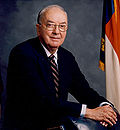 Jesse Helms Jesse HelmsJesse Helms Jesse Alexander Helms, Jr. was a five-term Republican United States Senator from North Carolina who served as chairman of the Senate Foreign Relations Committee from 1995 to 2001... |
Republican | January 3, 1973 – January 3, 2003 |
93 93rd United States Congress The Ninety-third United States Congress was a meeting of the legislative branch of the United States federal government, composed of the United States Senate and the United States House of Representatives. It met in Washington, DC from January 3, 1973 to January 3, 1975, during the end of Richard... |
32 | Elected in 1972 United States Senate election in North Carolina, 1972 The North Carolina United States Senate election of 1972 was held on 7 November 1972 as part of the nation-wide elections to the Senate, and coinciding with the 1972 presidential election. The general election was fought between the Republican nominee Jesse Helms and the Democrat nominee Rep. Nick... |
| 94 94th United States Congress The Ninety-fourth United States Congress was a meeting of the legislative branch of the United States federal government, composed of the United States Senate and the United States House of Representatives. It met in Washington, DC from January 3, 1975 to January 3, 1977, during the administration... |
||||||
| 95 95th United States Congress The Ninety-fifth United States Congress was a meeting of the legislative branch of the United States federal government, composed of the United States Senate and the United States House of Representatives. It met in Washington, DC from January 3, 1977 to January 3, 1979, during the first two years... |
||||||
| 96 96th United States Congress The Ninety-sixth United States Congress was a meeting of the legislative branch of the United States federal government, composed of the United States Senate and the United States House of Representatives. It met in Washington, DC from January 3, 1979 to January 3, 1981, during the last two years... |
33 | Re-elected in 1978 United States Senate election in North Carolina, 1978 The North Carolina United States Senate election of 1978 was held on 7 November 1978 as part of the nation-wide elections to the Senate. The general election was fought between the Republican incumbent Jesse Helms and the Democrat nominee John Ingram. Helms won re-election, by a slightly wider... |
||||
| 97 97th United States Congress The Ninety-seventh United States Congress was a meeting of the legislative branch of the United States federal government, composed of the United States Senate and the United States House of Representatives. It met in Washington, DC from January 3, 1981 to January 3, 1983, during the final weeks of... |
||||||
| 98 98th United States Congress The Ninety-eighth United States Congress was a meeting of the legislative branch of the United States federal government, composed of the United States Senate and the United States House of Representatives. It met in Washington, DC from January 3, 1983 to January 3, 1985, during the third and... |
||||||
| 99 99th United States Congress The Ninety-ninth United States Congress was a meeting of the legislative branch of the United States federal government, composed of the United States Senate and the United States House of Representatives. It met in Washington, DC from January 3, 1985 to January 3, 1987, during the fifth and sixth... |
34 | Re-elected in 1984 United States Senate election in North Carolina, 1984 The North Carolina United States Senate election of 1984 was held on 6 November 1984 as part of the nation-wide elections to the Senate, and coinciding with the 1984 presidential election. The election was fought between the Republican incumbent Jesse Helms and serving Democratic Governor Jim Hunt... |
||||
| 100 100th United States Congress -House of Representatives:- Senate :* President: George H.W. Bush * President pro tempore: John Stennis - Majority leadership :* Majority Leader, Democratic Conference Chairman, and Democratic Policy Committee Chairman: Robert Byrd... |
||||||
| 101 101st United States Congress The One Hundred First United States Congress was a meeting of the legislative branch of the United States federal government, composed of the United States Senate and the United States House of Representatives. It met in Washington, DC from January 3, 1989 to January 3, 1991, during the first two... |
||||||
| 102 102nd United States Congress -House of Representatives:- Senate :* President:Dan Quayle * President pro tempore: Robert Byrd - Majority leadership :* Majority Leader: George Mitchell* Majority Whip: Wendell Ford- Minority leadership :... |
35 | Re-elected in 1990 United States Senate election in North Carolina, 1990 The North Carolina United States Senate election of 1990 was held on 6 November 1990 as part of the nation-wide elections to the Senate. The general election was fought between the Republican incumbent Jesse Helms and the Democrat nominee Mayor of Charlotte Harvey Gantt... |
||||
| 103 103rd United States Congress - House of Representatives :- Leadership :- Senate :* President: Dan Quayle , until January 20, 1993** Al Gore , from January 20, 1993* President pro tempore: Robert Byrd - Majority leadership :* Majority Leader: George Mitchell... |
||||||
| 104 104th United States Congress The One Hundred Fourth United States Congress was a meeting of the legislative branch of the United States federal government, composed of the United States Senate and the United States House of Representatives. It met in Washington, DC from January 3, 1995 to January 3, 1997, during the third and... |
||||||
| 105 105th United States Congress The One Hundred Fifth United States Congress was a meeting of the legislative branch of the United States federal government, composed of the United States Senate and the United States House of Representatives. It met in Washington, DC from January 3, 1997 to January 3, 1999, during the fifth and... |
36 | Re-elected in 1996 United States Senate election in North Carolina, 1996 The North Carolina United States Senate election of 1996 was held on 5 November 1996 as part of the nation-wide elections to the Senate, and coinciding with the 1996 presidential election. The general election was a rematch of the 1990 election: between the Republican incumbent Jesse Helms and the... Retired |
||||
| 106 106th United States Congress The One Hundred Sixth United States Congress was a meeting of the legislative branch of the United States federal government, composed of the United States Senate and the United States House of Representatives. It met in Washington, DC from January 3, 1999 to January 3, 2001, during the last two... |
||||||
| 107 107th United States Congress The One Hundred Seventh United States Congress was a meeting of the legislative branch of the United States federal government, composed of the United States Senate and the United States House of Representatives. It met in Washington, D.C. from January 3, 2001 to January 3, 2003, during the final... |
||||||
| 24 | 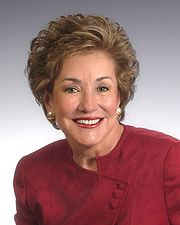 Elizabeth Dole Elizabeth DoleElizabeth Dole Mary Elizabeth Alexander Hanford "Liddy" Dole is an American politician who served in both the Ronald Reagan and George H. W. Bush presidential administrations, as well as a United States Senator.... |
Republican | January 3, 2003 – January 3, 2009 |
108 108th United States Congress The One Hundred Eighth United States Congress was the legislative branch of the United States federal government, composed of the United States Senate and the United States House of Representatives from January 3, 2003 to January 3, 2005, during the third and fourth years of George W. Bush's... |
37 | Elected in 2002 United States Senate election in North Carolina, 2002 The 2002 United States Senate election in North Carolina was held on November 5, 2002. Incumbent Republican U.S. Senator Jesse Helms decided to retire due to health reasons. Republican Elizabeth Dole won the open seat.-Candidates:... Lost re-election |
| 109 109th United States Congress The One Hundred Ninth United States Congress was the legislative branch of the United States, composed of the United States Senate and the United States House of Representatives, from January 3, 2005 to January 3, 2007, during the fifth and sixth years of George W. Bush's presidency. House members... |
||||||
| 110 110th United States Congress The One Hundred Tenth United States Congress was the meeting of the legislative branch of the United States federal government, between January 3, 2007, and January 3, 2009, during the last two years of the second term of President George W. Bush. It was composed of the Senate and the House of... |
||||||
| 25 |  Kay Hagan Kay Hagan |
Democratic | January 3, 2009 – Present |
111 111th United States Congress The One Hundred Eleventh United States Congress was the meeting of the legislative branch of the United States federal government from January 3, 2009 until January 3, 2011. It began during the last two weeks of the George W. Bush administration, with the remainder spanning the first two years of... |
38 | Elected in 2008 United States Senate election in North Carolina, 2008 The 2008 United States Senate election in North Carolina was held on November 4, 2008. The Senate election coincided with the presidential, U.S. House elections, gubernatorial, Council of State, and statewide judicial elections. Incumbent Republican U.S. Senator Elizabeth Dole ran for re-election... |
| 112 112th United States Congress The One Hundred Twelfth United States Congress is the current meeting of the legislative branch of the United States federal government, composed of the United States Senate and the United States House of Representatives. It convened in Washington, D.C. on January 3, 2011, and will end on January... |
||||||
| 113 113th United States Congress The One Hundred Thirteenth United States Congress will be the next meeting of the legislative branch of the United States federal government after the 112th Congress is seated. It will be composed of the United States Senate and the United States House of Representatives. It is scheduled to meet... |
||||||
Class 3
Class 3 U.S. SenatorsClasses of United States Senators
The three classes of United States Senators are currently made up of 33 or 34 Senate seats. The purpose of the classes is to determine which Senate seats will be up for election in a given year. The three groups are staggered so that one of them is up for election every two years.A senator's...
belong to the electoral cycle that were elected for three Congresses in the first election of 1788/1789 and whose seats in recent years are contested in 1992
United States Senate election in North Carolina, 1992
The 1992 United States Senate election in North Carolina was held on 3 November 1992 as part of the nation-wide elections to the Senate. Incumbent Democrat Terry Sanford lost re-election to a second term to Republican Lauch Faircloth.-Republican:...
, 1998
United States Senate election in North Carolina, 1998
The 1998 United States Senate election in North Carolina was held on November 3, 1998. Incumbent Republican U.S. Senator Lauch Faircloth decided to seek re-election to a second term, but was defeated by Democrat John Edwards.- Campaign :...
, 2004
United States Senate election in North Carolina, 2004
The 2004 United States Senate election in North Carolina was held on November 2, 2004. Incumbent Democratic U.S. Senator John Edwards decided to retire from the Senate, ran unsuccessfully for the 2004 Democratic Party presidential nomination, and became his party's vice presidential nominee...
, 2010
United States Senate election in North Carolina, 2010
The 2010 United States Senate election in North Carolina was held on November 2, 2010. The filing deadline for the primaries was February 26; the primaries were held on May 4, with a Democratic primary runoff held on June 22. Incumbent Republican U.S. Senator Richard Burr won re-election to a...
, and will be contested in 2016.
| # | Senator | Party | Years | Congress | Term | Electoral history |
|---|---|---|---|---|---|---|
| 1 | 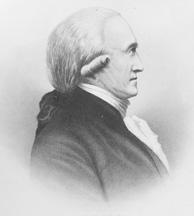 Benjamin Hawkins Benjamin HawkinsBenjamin Hawkins Benjamin Hawkins was an American planter, statesman, and United States Indian agent . He was a delegate to the Continental Congress and a United States Senator from North Carolina, having grown up among the planter elite... |
Pro- Administration |
November 27, 1789 – March 4, 1795 |
1 1st United States Congress -House of Representatives:During this congress, five House seats were added for North Carolina and one House seat was added for Rhode Island when they ratified the Constitution.-Senate:* President: John Adams * President pro tempore: John Langdon... |
1 | Elected in 1789 |
| 2 2nd United States Congress -House of Representatives:During this congress, two new House seats were added for each of the new states of Vermont and Kentucky. -Leadership:-Senate:*President: John Adams *President pro tempore:** Richard Henry Lee... |
||||||
| Anti- Administration |
3 3rd United States Congress The Third United States Congress was a meeting of the legislative branch of the United States federal government, consisting of the United States Senate and the United States House of Representatives... |
|||||
| 2 |  Timothy Bloodworth Timothy BloodworthTimothy Bloodworth Timothy Bloodworth was an American teacher and statesman from North Carolina.He was born in North Carolina in 1736 and spent most of his life before the American Revolutionary War as a teacher. In 1776, he began making arms including muskets and bayonets for the Continental Army. In 1778 and... |
Democratic- Republican |
March 4, 1795 – March 4, 1801 |
4 4th United States Congress -House of Representatives:- Senate :* President: John Adams * President pro tempore:** Henry Tazewell , first elected December 7, 1795** Samuel Livermore , first elected May 6, 1796** William Bingham , first elected February 16, 1797... |
2 | Elected in 1795 |
| 5 5th United States Congress The Fifth United States Congress was a meeting of the legislative branch of the United States federal government, consisting of the United States Senate and the United States House of Representatives... |
||||||
| 6 6th United States Congress The Sixth United States Congress was a meeting of the legislative branch of the United States federal government, consisting of the United States Senate and the United States House of Representatives. It met at Congress Hall in Philadelphia, Pennsylvania and in Washington, D.C. from March 4, 1799... |
||||||
| 3 |  David Stone David StoneDavid Stone David Stone was the 15th Governor of the U.S. state of North Carolina from 1808 to 1810. Both before and after his term as governor, he served as a U.S. senator, between 1801 and 1807 and between 1813 and 1814.-Biography:... |
March 4, 1801 – February 17, 1807 |
Democratic- Republican |
7 7th United States Congress - House of Representatives :-Senate:* President: Aaron Burr * President pro tempore:** Abraham Baldwin , first elected December 7, 1801** Stephen R. Bradley , first elected December 14, 1802-House of Representatives:... |
3 | Elected in 1800 United States Senate elections, 1800 The United States Senate election of 1800 was an election for the United States Senate which, coinciding with their takeover of the White House, had the Democratic-Republican Party take control of the United States Senate.... Resigned to return to the State Superior Court North Carolina Superior Court The Superior Court is North Carolina’s general jurisdiction trial court. It has jurisdiction over all felony cases, cases involving over $10,000, and appeals of misdemeanor and infraction cases from the North Carolina District Courts.... |
| 8 8th United States Congress - Senate :* President: Aaron Burr * President pro tempore: John Brown , October 17, 1803 – February 26, 1804** Jesse Franklin , March 10, 1804 – November 4, 1804** Joseph Anderson , January 15, 1805 – December 1, 1805- House of Representatives :... |
||||||
| 9 9th United States Congress - Senate :* President: George Clinton * President pro tempore: Samuel Smith - House of Representatives :* Speaker: Nathaniel Macon -Members:This list is arranged by chamber, then by state... |
||||||
| Vacant | February 17, 1807 – March 4, 1807 |
|||||
| 4 |  Jesse Franklin Jesse FranklinJesse Franklin Jesse Franklin was the Democratic-Republican U.S. senator from the U.S. state of North Carolina between 1799 and 1805 and between 1807 and 1813. He later served as the 20th Governor of North Carolina from 1820 to 1821.... |
Democratic- Republican |
March 4, 1807 – March 4, 1813 |
10 10th United States Congress - House of Representatives :- Senate :*President: George Clinton *President pro tempore: Samuel Smith , elected April 16, 1808** Stephen R. Bradley , elected December 28, 1808** John Milledge , elected January 30, 1809... |
4 | Elected in 1806 United States Senate elections, 1806 The United States Senate election of 1806 was an election which had the Democratic-Republican Party increase its overwhelming control of the Senate by one additional Senator.... Retired |
| 11 11th United States Congress - House of Representatives :-Leadership:- Senate :* President: George Clinton * President pro tempore:** John Milledge ** Andrew Gregg , elected June 26, 1809** John Gaillard , elected February 28, 1810... |
||||||
| 12 12th United States Congress - House of Representatives :During this congress, one new House seat was added for the new state of Louisiana.- Senate :*President: George Clinton *President pro tempore: William H. Crawford -House of Representatives:*Speaker: Henry Clay... |
||||||
| 5 |  David Stone David StoneDavid Stone David Stone was the 15th Governor of the U.S. state of North Carolina from 1808 to 1810. Both before and after his term as governor, he served as a U.S. senator, between 1801 and 1807 and between 1813 and 1814.-Biography:... |
Democratic- Republican |
March 4, 1813 – December 24, 1814 |
13 13th United States Congress - Senate :* President: Elbridge Gerry , until November 23, 1814, thereafter vacant.* President pro tempore: Joseph B. Varnum , December 6, 1813 – February 3, 1814** John Gaillard , elected November 25, 1814- House of Representatives :... |
5 | Elected in 1813 Resigned |
| Vacant | December 24, 1814 – December 1814 |
|||||
| 6 | Francis Locke Francis Locke Francis Locke was a U.S. senator from the state of North Carolina. Francis Locke was the son of Francis Locke and Anne Brandon... |
Democratic- Republican |
December 1814 – December 5, 1815 |
13 13th United States Congress - Senate :* President: Elbridge Gerry , until November 23, 1814, thereafter vacant.* President pro tempore: Joseph B. Varnum , December 6, 1813 – February 3, 1814** John Gaillard , elected November 25, 1814- House of Representatives :... (Continued) |
Elected to finish Stone's term Resigned without having qualified |
|
| 14 14th United States Congress - Senate :* President: Vacant* President pro tempore: John Gaillard of South Carolina, first elected December 4, 1815- House of Representatives :* Speaker: Henry Clay of Kentucky-Members:This list is arranged by chamber, then by state... |
||||||
| Vacant | December 5, 1815 – December 13, 1815 |
|||||
| 7 | 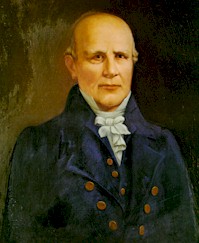 Nathaniel Macon Nathaniel MaconNathaniel Macon Nathaniel Macon was a spokesman for the Old Republican faction of the Democratic-Republican Party that wanted to strictly limit the United States federal government. Macon was born near Warrenton, North Carolina, and attended the College of New Jersey and served briefly in the American... |
Democratic- Republican |
December 13, 1815 – November 14, 1828 |
14 14th United States Congress - Senate :* President: Vacant* President pro tempore: John Gaillard of South Carolina, first elected December 4, 1815- House of Representatives :* Speaker: Henry Clay of Kentucky-Members:This list is arranged by chamber, then by state... (Continued) |
Elected to finish Locke's term | |
| 15 15th United States Congress -Leadership:- Senate :* President: Daniel D. Tompkins * President pro tempore:** John Gaillard , elected March 4, 1817** James Barbour , elected February 15, 1819- House of Representatives :*Speaker: Henry Clay -Members:... |
||||||
| 16 16th United States Congress -House of Representatives:During this congress, one House seat was added for the new state of Alabama and one seat was reapportioned from Massachusetts to the new state of Maine. For the beginning of the next congress, six more seats from Massachusetts would be reapportioned to... |
6 | Elected to full term in 1819 | ||||
| 17 17th United States Congress The Seventeenth United States Congress was a meeting of the legislative branch of the United States federal government, consisting of the United States Senate and the United States House of Representatives. It met in Washington, D.C. from March 4, 1821 to March 3, 1823, during the fifth and sixth... |
||||||
| Crawford Republican |
18 18th United States Congress The Eighteenth United States Congress was a meeting of the legislative branch of the United States federal government, consisting of the United States Senate and the United States House of Representatives. It met in Washington, D.C. from March 4, 1823 to March 3, 1825, during the seventh and eighth... |
|||||
| Jacksonian | 19 19th United States Congress -House of Representatives:-Leadership:- Senate :* President: John C. Calhoun * President pro tempore: John Gaillard , until December 4, 1825** Nathaniel Macon , from May 20, 1826- House of Representatives :* Speaker: John W. Taylor -Members:... |
7 | Re-elected in 1825 Resigned |
|||
| 20 20th United States Congress -House of Representatives:-Leadership:- Senate :* President: John C. Calhoun * President pro tempore: Samuel Smith - House of Representatives :* Speaker: Andrew Stevenson -Members:This list is arranged by chamber, then by state... |
||||||
| Vacant | November 14, 1828 – December 15, 1828 |
|||||
| 8 | 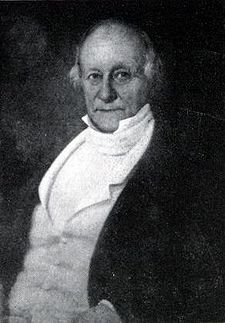 James Iredell, Jr. James Iredell, Jr.James Iredell, Jr. James Iredell, Jr. was the 23rd Governor of the U.S. state of North Carolina between 1827 and 1828.-Early life:... |
Jacksonian | December 15, 1828 – March 4, 1831 |
20 20th United States Congress -House of Representatives:-Leadership:- Senate :* President: John C. Calhoun * President pro tempore: Samuel Smith - House of Representatives :* Speaker: Andrew Stevenson -Members:This list is arranged by chamber, then by state... (Continued) |
Elected to finish Macon's term Retired |
|
| 21 21st United States Congress -House of Representatives:-Leadership:- Senate :* President: John C. Calhoun * President pro tempore: Samuel Smith - House of Representatives :* Speaker: Andrew Stevenson -Members:This list is arranged by chamber, then by state... |
||||||
| 9 |  Willie Mangum Willie MangumWillie Person Mangum Willie Person Mangum was a U.S. Senator from the state of North Carolina between 1831 and 1836 and between 1840 and 1853. He was one of the founders and leading members of the Whig party, and was a candidate for President on a Whig ticket in 1836.Mangum was born in Durham County, North Carolina... |
Jacksonian | March 4, 1831 – March 19, 1836 |
22 22nd United States Congress -House of Representatives:-Leadership:- Senate :* President:** John C. Calhoun , resigned December 28, 1832, thereafter vacant.* President pro tempore:** Samuel Smith , first elected December 5, 1831** Littleton W... |
8 | Elected in 1830 United States Senate elections, 1830 The United States Senate election of 1830 was an election which had the Jacksonian coalition lose a seat in the United States Senate to the Anti-Jackson coalition.... Resigned |
| Anti-Jacksonian | 23 23rd United States Congress -House of Representatives:For the beginning of this congress, the size of the House was increased from 213 seats to 240 seats, following the 1830 United States Census .- Leadership :- Senate :* President: Martin Van Buren... |
|||||
| 24 24th United States Congress -House of Representatives:During this congress one House seat was added for each of the new states of Arkansas and Michigan.-Leadership:- Senate :* President: Martin Van Buren * President pro tempore: William R. King - House of Representatives :... |
||||||
| Vacant | March 19, 1836 – December 5, 1836 |
|||||
| 10 | 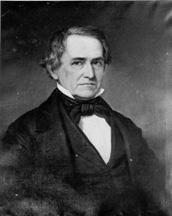 Robert Strange Robert StrangeRobert Strange Robert Strange was a Democratic U.S. senator from the state of North Carolina between 1836 and 1840.Strange was born in Manchester, Virginia. He attended New Oxford Academy and Washington College in Lexington, Virginia... |
Jacksonian | December 5, 1836 – November 16, 1840 |
24 24th United States Congress -House of Representatives:During this congress one House seat was added for each of the new states of Arkansas and Michigan.-Leadership:- Senate :* President: Martin Van Buren * President pro tempore: William R. King - House of Representatives :... (Continued) |
Elected to finish Mangum's term | |
| Democratic | 25 25th United States Congress -House of Representatives:-Leadership:- Senate :* President: Richard Mentor Johnson * President pro tempore: William R. King - House of Representatives :* Speaker: James K. Polk -Members:This list is arranged by chamber, then by state... |
9 | Elected to full term in 1836 United States Senate elections, 1836 The United States Senate election of 1836 was an election which had the Jacksonian coalition emerge as the Democratic Party, with the Adams, or Anti-Jackson, coalition emerge as the Whig Party... Resigned |
|||
| 26 26th United States Congress -House of Representatives:- Leadership :- Senate :*President: Richard M. Johnson *President pro tempore: William R. King - House of Representatives :*Speaker: Robert M.T. Hunter -Members:This list is arranged by chamber, then by state... |
||||||
| Vacant | November 16, 1840 – November 25, 1840 |
|||||
| 11 |  William Alexander Graham William Alexander GrahamWilliam Alexander Graham William Alexander Graham was a United States Senator from North Carolina from 1840 to 1843, the 30th Governor of North Carolina from 1845 to 1849 and United States Secretary of the Navy from 1850 to 1852. He was also a candidate for the vice-presidency in 1852.-Education:Graham was born near... |
Whig | November 25, 1840 – March 4, 1843 |
26 26th United States Congress -House of Representatives:- Leadership :- Senate :*President: Richard M. Johnson *President pro tempore: William R. King - House of Representatives :*Speaker: Robert M.T. Hunter -Members:This list is arranged by chamber, then by state... (Continued) |
Elected to finish Strange's term |
|
| 27 27th United States Congress The Twenty-seventh United States Congress was a meeting of the legislative branch of the United States federal government, consisting of the United States Senate and the United States House of Representatives. It met in Washington, D.C. from March 4, 1841 to March 3, 1843, during the one-month... |
||||||
| 12 |  William H. Haywood, Jr. William H. Haywood, Jr. |
Democratic | March 4, 1843 – July 25, 1846 |
28 28th United States Congress -House of Representatives:Following the 1840 United States Census, Congress reapportioned the House to include 223 seats . During this congress, one House seat was added for the new state of Florida .- Senate :*President: Vacant... |
10 | Elected in 1843 Resigned |
| 29 29th United States Congress -House of Representatives:During this congress, two House seats were added for each of the new states of Texas and Iowa.-Leadership:-Senate:* President: George M. Dallas * President pro tempore: Willie P. Mangum... |
||||||
| Vacant | July 25, 1846 – November 25, 1846 |
|||||
| 13 | 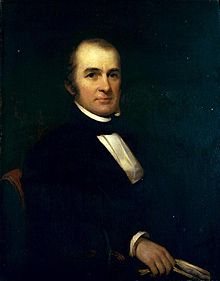 George Badger George BadgerGeorge Edmund Badger George Edmund Badger was a Whig U.S. senator from the state of North Carolina.Badger was born on April 17, 1795 in New Bern, North Carolina. Following a partial college education at Yale University, he studied law and was admitted to the bar in 1814... |
Whig | November 25, 1846 – March 4, 1855 |
29 29th United States Congress -House of Representatives:During this congress, two House seats were added for each of the new states of Texas and Iowa.-Leadership:-Senate:* President: George M. Dallas * President pro tempore: Willie P. Mangum... (Continued) |
Elected to finish Haywood's term | |
| 30 30th United States Congress The Thirtieth United States Congress was a meeting of the legislative branch of the United States federal government, consisting of the United States Senate and the United States House of Representatives. It met in Washington, D.C. from March 4, 1847 to March 3, 1849, during the last two years of... |
||||||
| 31 31st United States Congress The Thirty-first United States Congress was a meeting of the legislative branch of the United States federal government, consisting of the United States Senate and the United States House of Representatives. It met in Washington, D.C. from March 4, 1849 to March 3, 1851, during the last 17 months... |
11 | Re-elected in 1849 Retired |
||||
| 32 32nd United States Congress The Thirty-second United States Congress was a meeting of the legislative branch of the United States federal government, consisting of the United States Senate and the United States House of Representatives. It met in Washington, D.C. from March 4, 1851 to March 3, 1853, during the third and... |
||||||
| 33 33rd United States Congress The Thirty-third United States Congress was a meeting of the legislative branch of the United States federal government, consisting of the United States Senate and the United States House of Representatives. It met in Washington, D.C. from March 4, 1853 to March 3, 1855, during the first two years... |
||||||
| 14 | Asa Biggs Asa Biggs Asa Biggs was a North Carolina politician who held a number of positions. He was a U.S. Representative, a U.S. Senator, and federal judge.... |
Democratic | March 4, 1855 – May 5, 1858 |
34 34th United States Congress The Thirty-fourth United States Congress was a meeting of the legislative branch of the United States federal government, consisting of the United States Senate and the United States House of Representatives. It met in Washington, D.C. from March 4, 1855 to March 4, 1857, during the last two years... |
12 | Elected in 1855 Resigned to become U.S. District Court Judge |
| 35 35th United States Congress The 35th United States Congress was a meeting of the legislative branch of the United States federal government, consisting of the United States Senate and the United States House of Representatives. It met in Washington, D.C. from March 4, 1857 to March 3, 1859, during the first two years of James... |
||||||
| Vacant | May 5, 1858 – May 7, 1858 |
|||||
| 15 | 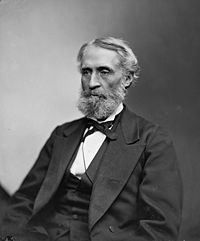 Thomas Clingman Thomas ClingmanThomas Lanier Clingman Thomas Lanier Clingman , known as the "Prince of Politicians," was a Democratic member of the United States House of Representatives from 1843 to 1845 and from 1847 to 1858, and U.S. senator from the state of North Carolina between 1858 and 1861... |
Democratic | May 7, 1858 – March 11, 1861 |
35 35th United States Congress The 35th United States Congress was a meeting of the legislative branch of the United States federal government, consisting of the United States Senate and the United States House of Representatives. It met in Washington, D.C. from March 4, 1857 to March 3, 1859, during the first two years of James... (Continued) |
Appointed to finish Biggs's term | |
| 36 36th United States Congress The Thirty-sixth United States Congress was a meeting of the legislative branch of the United States federal government, consisting of the United States Senate and the United States House of Representatives. It met in Washington, D.C. from March 4, 1859 to March 4, 1861, during the third and fourth... |
||||||
| 37 37th United States Congress The Thirty-seventh United States Congress was a meeting of the legislative branch of the United States federal government, consisting of the United States Senate and the United States House of Representatives. It met in Washington, D.C. from March 4, 1861 to March 4, 1863, during the first two... |
13 | Elected to full term in 1861 Withdrew, and subsequently expelled for support of the rebellion |
||||
| Vacant | March 11, 1861 – July 14, 1868 |
37 37th United States Congress The Thirty-seventh United States Congress was a meeting of the legislative branch of the United States federal government, consisting of the United States Senate and the United States House of Representatives. It met in Washington, D.C. from March 4, 1861 to March 4, 1863, during the first two... (Continued) |
Civil War and Reconstruction | |||
| 38 38th United States Congress -House of Representatives:Before this Congress, the 1860 United States Census and resulting reapportionment changed the size of the House to 241 members... |
||||||
| 39 39th United States Congress The Thirty-ninth United States Congress was a meeting of the legislative branch of the United States federal government, consisting of the United States Senate and the United States House of Representatives. It met in Washington, D.C. from March 4, 1865 to March 4, 1867, during the first month of... |
||||||
| 40 40th United States Congress The Fortieth United States Congress was a meeting of the legislative branch of the United States federal government, consisting of the United States Senate and the United States House of Representatives. It met in Washington, D.C. from March 4, 1867 to March 4, 1869, during the third and fourth... |
14 | |||||
| 16 | 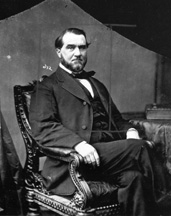 John Pool John PoolJohn Pool John Pool was a Republican U.S. Senator from the state of North Carolina between 1868 and 1873. He was also the uncle of Congressman Walter Freshwater Pool.... |
Republican | July 14, 1868 – March 4, 1873 |
40 40th United States Congress The Fortieth United States Congress was a meeting of the legislative branch of the United States federal government, consisting of the United States Senate and the United States House of Representatives. It met in Washington, D.C. from March 4, 1867 to March 4, 1869, during the third and fourth... (Continued) |
Elected to finish vacant term Retired |
|
| 41 41st United States Congress -House of Representatives:- Senate :* President : Schuyler Colfax* President pro tempore: Henry B. Anthony - House of Representatives :* Speaker: James G. Blaine -Members:This list is arranged by chamber, then by state... |
||||||
| 42 42nd United States Congress The Forty-second United States Congress was a meeting of the legislative branch of the United States federal government, consisting of the United States Senate and the United States House of Representatives. It met in Washington, D.C. from March 4, 1871 to March 3, 1873, during the third and fourth... |
||||||
| 17 | Augustus Merrimon Augustus Summerfield Merrimon Augustus Summerfield Merrimon was a Democratic U.S. senator from the state of North Carolina between 1873 and 1879.... |
Democratic | March 4, 1873 – March 4, 1879 |
43 43rd United States Congress The Forty-third United States Congress was a meeting of the legislative branch of the United States federal government, consisting of the United States Senate and the United States House of Representatives. It met in Washington, D.C. from March 4, 1873 to March 4, 1875, during the fifth and sixth... |
15 | Elected in 1872 United States Senate elections, 1872 The United States Senate election of 1872 was an election which had the Republican Party, while still retaining a commanding majority, lose nine seats in the United States Senate, mostly as defections to the Liberal Republican Party. It also coincided with President Ulysses S... Lost re-election |
| 44 44th United States Congress The Forty-fourth United States Congress was a meeting of the legislative branch of the United States federal government, consisting of the United States Senate and the United States House of Representatives. It met in Washington, D.C. from March 4, 1875 to March 4, 1877, during the seventh and... |
||||||
| 45 45th United States Congress -House of Representatives:-Leadership:-Senate:*President: William A. Wheeler *President pro tempore: Thomas W. Ferry -House of Representatives:*Speaker: Samuel J. Randall -Members:This list is arranged by chamber, then by state... |
||||||
| 18 |  Zebulon Vance Zebulon VanceZebulon Baird Vance Zebulon Baird Vance was a Confederate military officer in the American Civil War, the 37th and 43rd Governor of North Carolina, and U.S. Senator... |
Democratic | March 4, 1879 – April 14, 1894 |
46 46th United States Congress The Forty-sixth United States Congress was a meeting of the legislative branch of the United States federal government, consisting of the United States Senate and the United States House of Representatives. It met in Washington, D.C. from March 4, 1879 to March 4, 1881, during the last two years of... |
16 | Elected in 1879 |
| 47 47th United States Congress The Forty-seventh United States Congress was a meeting of the legislative branch of the United States federal government, consisting of the United States Senate and the United States House of Representatives. It met in Washington, D.C. from March 4, 1881 to March 4, 1883, during the administration... |
||||||
| 48 48th United States Congress The Forty-eighth United States Congress was a meeting of the legislative branch of the United States federal government, consisting of the United States Senate and the United States House of Representatives. It met in Washington, D.C. from March 4, 1883 to March 4, 1885, during the last two years... |
||||||
| 49 49th United States Congress The Forty-ninth United States Congress was a meeting of the legislative branch of the United States federal government, consisting of the United States Senate and the United States House of Representatives. It met in Washington, D.C. from March 4, 1885 to March 4, 1887, during the first two years... |
17 | Re-elected in 1884 United States Senate elections, 1884 The United States Senate election of 1884 was an election which had the Republican Party gain four seats in the United States Senate, and which coincided with the presidential election of 1884.... |
||||
| 50 50th United States Congress The Fiftieth United States Congress was a meeting of the legislative branch of the United States federal government, consisting of the United States Senate and the United States House of Representatives. It met in Washington, D.C. from March 4, 1887 to March 4, 1889, during the third and fourth... |
||||||
| 51 51st United States Congress The Fifty-first United States Congress, referred to by some critics as the Billion Dollar Congress, was a meeting of the legislative branch of the United States federal government, consisting of the United States Senate and the United States House of Representatives. It met in Washington, D.C... |
||||||
| 52 52nd United States Congress The Fifty-second United States Congress was a meeting of the legislative branch of the United States federal government, consisting of the United States Senate and the United States House of Representatives. It met in Washington, D.C... |
18 | Re-elected in 1892 United States Senate elections, 1892 The United States Senate election of 1892 was an election which, corresponding with former President Grover Cleveland's return to power, had the Republican Party lose seven seats in the United States Senate and lose its majority to the Democratic Party.... Died |
||||
| Vacant | April 14, 1894 – April 19, 1894 |
|||||
| 19 | 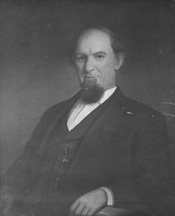 Thomas J. Jarvis Thomas J. Jarvis |
Democratic | April 19, 1894 – January 23, 1895 |
Appointed to continue Vance's term Successor qualified |
||
| 20 | Jeter Pritchard Jeter Connelly Pritchard Jeter Connelly Pritchard was a Republican U.S. Senator from the state of North Carolina between 1895 and 1903. He was the only Republican to represent a southern state in the United States Senate during that time.... |
Republican | January 23, 1895 – March 4, 1903 |
52 52nd United States Congress The Fifty-second United States Congress was a meeting of the legislative branch of the United States federal government, consisting of the United States Senate and the United States House of Representatives. It met in Washington, D.C... (Continued) |
Elected to finish Vance's term | |
| 53 53rd United States Congress The Fifty-third United States Congress was a meeting of the legislative branch of the United States federal government, consisting of the United States Senate and the United States House of Representatives. It met in Washington, D.C. from March 4, 1893 to March 4, 1895, during the fifth and sixth... |
||||||
| 54 54th United States Congress - House of Representatives :-Leadership:- Senate :* President: Adlai E. Stevenson * President pro tempore: William P. Frye - Majority leadership :* Republican Conference Chairman: John Sherman- Minority leadership :... |
||||||
| 55 55th United States Congress -House of Representatives:* Republican: 206 * Democratic: 124* Populist: 22* Silver Republican: 3* Silver: 1* Independent Republican: 1TOTAL members: 357-Leadership:-Senate:* President: Garret Hobart * President pro tempore: William P... |
19 | Elected to full term in 1897 Lost re-election |
||||
| 56 56th United States Congress -House of Representatives:- Leadership :- Senate :* President: Garret Hobart , until November 21, 1899 , vacant thereafter.* President pro tempore: William P. Frye * Democratic Caucus Chairman: James K. Jones... |
||||||
| 57 57th United States Congress -House of Representatives:*Democratic: 151*Republican: 200 *Populist: 5*Silver : 1TOTAL members: 357-Leadership:-Senate:* President: Theodore Roosevelt , until September 14, 1901, vacant thereafter.... |
||||||
| 21 | 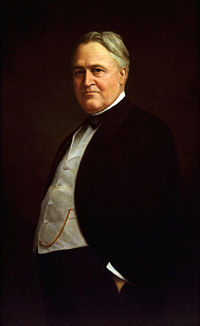 Lee S. Overman Lee S. Overman |
Democratic | March 4, 1903 – December 12, 1930 |
58 58th United States Congress - House of Representatives :* Republican : 209 * Democratic : 176* Silver Republican : 1TOTAL members: 386-Senate:* President: Vacant* President pro tempore: William P. Frye -Members:... |
20 | Elected in 1903 |
| 59 59th United States Congress The Fifty-ninth United States Congress was a meeting of the legislative branch of the United States federal government, composed of the United States Senate and the United States House of Representatives. It met in Washington, DC from March 4, 1905 to March 4, 1907, during the fifth and sixth... |
||||||
| 60 60th United States Congress The Sixtieth United States Congress was a meeting of the legislative branch of the United States federal government, composed of the United States Senate and the United States House of Representatives. It met in Washington, DC from March 4, 1907 to March 4, 1909, during the last two years of... |
||||||
| 61 61st United States Congress The Sixty-first United States Congress was a meeting of the legislative branch of the United States federal government, composed of the United States Senate and the United States House of Representatives. It met in Washington, DC from March 4, 1909 to March 4, 1911, during the first two years of... |
21 | Re-elected in 1909 | ||||
| 62 62nd United States Congress - House of Representatives :* Democratic : 230 * Republican : 162* Socialist : 1* Independent : 1TOTAL members: 394-Senate:* President: James S... |
||||||
| 63 63rd United States Congress - House of Representatives:*Democratic : 291 *Republican : 134*Progressive : 9*Independent : 1TOTAL members: 435-Senate:*President of the Senate: Thomas R. Marshall*President pro tempore: James P. Clarke-Senate:... |
||||||
| 64 64th United States Congress The Sixty-fourth United States Congress was a meeting of the legislative branch of the United States federal government, composed of the United States Senate and the United States House of Representatives. It met in Washington, DC from March 4, 1915 to March 4, 1917, during the third and fourth... |
22 | Re-elected in 1914 | ||||
| 65 65th United States Congress The Sixty-fifth United States Congress was a meeting of the legislative branch of the United States federal government, composed of the United States Senate and the United States House of Representatives. It met in Washington, DC from March 4, 1917 to March 4, 1919, during the fourth and fifth... |
||||||
| 66 66th United States Congress The Sixty-sixth United States Congress was a meeting of the legislative branch of the United States federal government, comprising the United States Senate and the United States House of Representatives. It met in Washington, DC from March 4, 1919 to March 4, 1921, during the last two years of... |
||||||
| 67 67th United States Congress The Sixty-seventh United States Congress was a meeting of the legislative branch of the United States federal government, consisting of the United States Senate and the United States House of Representatives. It met in Washington, D.C. from March 4, 1921 to March 4, 1923, during the first two years... |
23 | Re-elected in 1920 | ||||
| 68 68th United States Congress The Sixty-eighth United States Congress was a meeting of the legislative branch of the United States federal government, consisting of the United States Senate and the United States House of Representatives. It met in Washington, D.C. from March 4, 1923 to March 4, 1925, during the last months of... |
||||||
| 69 69th United States Congress The Sixty-ninth United States Congress was a meeting of the legislative branch of the United States federal government, consisting of the United States Senate and the United States House of Representatives. It met in Washington, D.C. from March 4, 1925 to March 4, 1927, during the third and fourth... |
||||||
| 70 70th United States Congress The Seventieth United States Congress was a meeting of the legislative branch of the United States federal government, consisting of the United States Senate and the United States House of Representatives. It met in Washington, D.C. from March 4, 1927 to March 3, 1929, during the last two years of... |
24 | Re-elected in 1926 Died |
||||
| 71 71st United States Congress The Seventy-first United States Congress was a meeting of the legislative branch of the United States federal government, consisting of the United States Senate and the United States House of Representatives. It met in Washington, D.C. from March 4, 1929 to March 4, 1931, during the first two years... |
||||||
| 22 |  Cameron A. Morrison Cameron A. MorrisonCameron A. Morrison Cameron A. Morrison was the 55th Governor of the U.S. state of North Carolina from 1921 to 1925.He was born in 1869 in Richmond County, North Carolina. With the backing of Sen. Furnifold Simmons and the help of race-baiting tactics employed by A. D. Watts, Morrison defeated O. Max Gardner in the... |
Democratic | December 13, 1930 – December 4, 1932 |
71 71st United States Congress The Seventy-first United States Congress was a meeting of the legislative branch of the United States federal government, consisting of the United States Senate and the United States House of Representatives. It met in Washington, D.C. from March 4, 1929 to March 4, 1931, during the first two years... (Continued) |
Appointed to continue Overman's term Lost election to finish Overman's term |
|
| 72 72nd United States Congress The Seventy-second United States Congress was a meeting of the legislative branch of the United States federal government, consisting of the United States Senate and the United States House of Representatives. It met in Washington, D.C. from March 4, 1931 to March 4, 1933, during the last two years... |
||||||
| 23 | 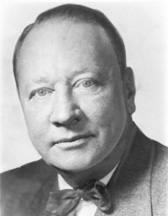 Robert Reynolds Robert ReynoldsRobert Rice Reynolds Robert Rice Reynolds was a Democratic U.S. senator from North Carolina between 1932 and 1945. Almost from the outset of his Senate career, "Our Bob," as he was known among supporters back home, acquired distinction as a passionate isolationist and increasingly as an apologist for Nazi aggression... |
Democratic | December 5, 1932 – January 3, 1945 |
72 72nd United States Congress The Seventy-second United States Congress was a meeting of the legislative branch of the United States federal government, consisting of the United States Senate and the United States House of Representatives. It met in Washington, D.C. from March 4, 1931 to March 4, 1933, during the last two years... (Continued) |
Elected to finish Overman's term | |
| 73 73rd United States Congress The Seventy-third United States Congress was a meeting of the legislative branch of the United States federal government, composed of the United States Senate and the United States House of Representatives. It met in Washington, DC from March 4, 1933 to January 3, 1935, during the first two years... |
25 | Elected to full term in 1932 | ||||
| 74 74th United States Congress -House:Also 2 Delegates, 3 Resident Commissioners-Senate:*President of the Senate: John N. Garner *President pro tempore: Key Pittman -Majority leadership:*Majority leader: Joseph T. Robinson... |
||||||
| 75 75th United States Congress The Seventy-fifth United States Congress was a meeting of the legislative branch of the United States federal government, composed of the United States Senate and the United States House of Representatives. It met in Washington, DC from January 3, 1937 to January 3, 1939, during the first two years... |
||||||
| 76 76th United States Congress The Seventy-sixth United States Congress was a meeting of the legislative branch of the United States federal government, composed of the United States Senate and the United States House of Representatives. It met in Washington, DC from January 3, 1939 to January 3, 1941, during the seventh and... |
26 | Re-elected in 1938 Retired |
||||
| 77 77th United States Congress -Major events:* December 7, 1941: Attack on Pearl Harbor* December 8, 1941: Joint Session of Congress met to hear President Roosevelt deliver his "Day of Infamy" speech... |
||||||
| 78 78th United States Congress The Seventy-eighth United States Congress was a meeting of the legislative branch of the United States federal government, composed of the United States Senate and the United States House of Representatives. It met in Washington, DC from January 3, 1943 to January 3, 1945, during the last two years... |
||||||
| 24 | Clyde R. Hoey Clyde R. Hoey Clyde Roark Hoey was a Democratic politician from North Carolina. He served in both houses of the state legislature and served briefly in the U.S. House of Representatives from 1919 to 1921. He was North Carolina's governor from 1937 to 1941. He entered the U.S... |
Democratic | January 3, 1945 – May 12, 1954 |
79 79th United States Congress The Seventy-ninth United States Congress was a meeting of the legislative branch of the United States federal government, composed of the United States Senate and the United States House of Representatives. It met in Washington, DC from January 3, 1945 to January 3, 1947, during the last months of... |
27 | Elected in 1944 |
| 80 80th United States Congress The Eightieth United States Congress was a meeting of the legislative branch of the United States federal government, composed of the United States Senate and the United States House of Representatives. It met in Washington, DC from January 3, 1947 to January 3, 1949, during the third and fourth... |
||||||
| 81 81st United States Congress The Eighty-first United States Congress was a meeting of the legislative branch of the United States federal government, composed of the United States Senate and the United States House of Representatives... |
||||||
| 82 82nd United States Congress The Eighty-second United States Congress was a meeting of the legislative branch of the United States federal government, composed of the United States Senate and the United States House of Representatives. It met in Washington, DC from January 3, 1951 to January 3, 1953, during the last two years... |
28 | Re-elected in 1950 Died |
||||
| 83 83rd United States Congress The Eighty-third United States Congress was a meeting of the legislative branch of the United States federal government, composed of the United States Senate and the United States House of Representatives. It met in Washington, DC from January 3, 1953 to January 3, 1955, during the first two years... |
||||||
| Vacant | May 12, 1954 – June 5, 1954 |
|||||
| 25 | 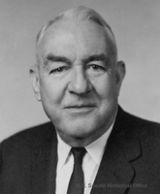 Sam Ervin Sam ErvinSam Ervin Samuel James "Sam" Ervin Jr. was a Democratic Senator from North Carolina from 1954 until 1974. A native of Morganton, Burke County, North Carolina, he liked to call himself a "country lawyer", and often told humorous stories in his Southern drawl... |
Democratic | June 5, 1954 – December 31, 1974 |
83 83rd United States Congress The Eighty-third United States Congress was a meeting of the legislative branch of the United States federal government, composed of the United States Senate and the United States House of Representatives. It met in Washington, DC from January 3, 1953 to January 3, 1955, during the first two years... (Continued) |
Appointed to continue Hoey's term Elected to finish Hoey's term |
|
| 84 84th United States Congress The Eighty-fourth United States Congress was a meeting of the legislative branch of the United States federal government, composed of the United States Senate and the United States House of Representatives. It met in Washington, DC from January 3, 1955 to January 3, 1957, during the third and... |
||||||
| 85 85th United States Congress The Eighty-fifth United States Congress was a meeting of the legislative branch of the United States federal government, composed of the United States Senate and the United States House of Representatives. It met in Washington, DC from January 3, 1957 to January 3, 1959, during the fifth and sixth... |
29 | Re-elected in 1956 | ||||
| 86 86th United States Congress The Eighty-sixth United States Congress was a meeting of the legislative branch of the United States federal government, composed of the United States Senate and the United States House of Representatives. It met in Washington, DC from January 3, 1959 to January 3, 1961, during the last two years... |
||||||
| 87 87th United States Congress -House of Representatives :-Senate:* President: Richard Nixon , until January 20, 1961** Lyndon Johnson , from January 20, 1961* President pro tempore: Carl Hayden -House of Representatives:... |
||||||
| 88 88th United States Congress The Eighty-eighth United States Congress was a meeting of the legislative branch of the United States federal government, composed of the United States Senate and the United States House of Representatives. It met in Washington, DC from January 3, 1963 to January 3, 1965, during the last year of... |
30 | Re-elected in 1962 | ||||
| 89 89th United States Congress -House of Representatives:- Senate :* President of the Senate: Hubert Humphrey , starting January 20, 1965* President pro tempore: Carl Hayden - Majority leadership :* Majority Leader and Democratic Conference Chairman: Mike Mansfield... |
||||||
| 90 90th United States Congress The Ninetieth United States Congress was a meeting of the legislative branch of the United States federal government, composed of the United States Senate and the United States House of Representatives. It met in Washington, DC from January 3, 1967 to January 3, 1969, during the last two years of... |
||||||
| 91 91st United States Congress The Ninety-first United States Congress was a meeting of the legislative branch of the United States federal government, composed of the United States Senate and the United States House of Representatives. It met in Washington, DC from January 3, 1969 to January 3, 1971, during the first two years... |
31 | Re-elected in 1968 United States Senate election in North Carolina, 1968 The North Carolina United States Senate election of 1968 was held on 5 November 1968 as part of the nation-wide elections to the Senate. The general election was fought between the Democratic incumbent Sam Ervin and the Republican nominee Robert Somers... Retired and resigned early |
||||
| 92 92nd United States Congress The Ninety-second United States Congress was a meeting of the legislative branch of the United States federal government, composed of the United States Senate and the United States House of Representatives... |
||||||
| 93 93rd United States Congress The Ninety-third United States Congress was a meeting of the legislative branch of the United States federal government, composed of the United States Senate and the United States House of Representatives. It met in Washington, DC from January 3, 1973 to January 3, 1975, during the end of Richard... |
||||||
| Vacant | December 31, 1974 – January 3, 1975 |
93 93rd United States Congress The Ninety-third United States Congress was a meeting of the legislative branch of the United States federal government, composed of the United States Senate and the United States House of Representatives. It met in Washington, DC from January 3, 1973 to January 3, 1975, during the end of Richard... (Continued) |
||||
| 26 | 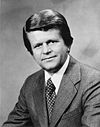 Robert B. Morgan Robert B. Morgan |
Democratic | January 3, 1975 – January 3, 1981 |
94 94th United States Congress The Ninety-fourth United States Congress was a meeting of the legislative branch of the United States federal government, composed of the United States Senate and the United States House of Representatives. It met in Washington, DC from January 3, 1975 to January 3, 1977, during the administration... |
32 | Elected in 1974 United States Senate election in North Carolina, 1974 The North Carolina United States Senate election of 1974 was held on 5 November 1974 as part of the nation-wide elections to the Senate. The general election was fought between the Democratic nominee Robert Morgan and the Republican nominee William Stevens. The seat had been vacated by Democrat... Lost re-election |
| 95 95th United States Congress The Ninety-fifth United States Congress was a meeting of the legislative branch of the United States federal government, composed of the United States Senate and the United States House of Representatives. It met in Washington, DC from January 3, 1977 to January 3, 1979, during the first two years... |
||||||
| 96 96th United States Congress The Ninety-sixth United States Congress was a meeting of the legislative branch of the United States federal government, composed of the United States Senate and the United States House of Representatives. It met in Washington, DC from January 3, 1979 to January 3, 1981, during the last two years... |
||||||
| 27 |  John P. East John P. East |
Republican | January 3, 1981 – June 29, 1986 |
97 97th United States Congress The Ninety-seventh United States Congress was a meeting of the legislative branch of the United States federal government, composed of the United States Senate and the United States House of Representatives. It met in Washington, DC from January 3, 1981 to January 3, 1983, during the final weeks of... |
33 | Elected in 1980 United States Senate election in North Carolina, 1980 The 1980 United States Senate election in North Carolina was held on November 2, 1980 as part of the nation-wide elections to the Senate. Incumbent Democratic U.S. Senator Robert Morgan lost re-election a second term to Republican John East.- Candidates :... Died |
| 98 98th United States Congress The Ninety-eighth United States Congress was a meeting of the legislative branch of the United States federal government, composed of the United States Senate and the United States House of Representatives. It met in Washington, DC from January 3, 1983 to January 3, 1985, during the third and... |
||||||
| 99 99th United States Congress The Ninety-ninth United States Congress was a meeting of the legislative branch of the United States federal government, composed of the United States Senate and the United States House of Representatives. It met in Washington, DC from January 3, 1985 to January 3, 1987, during the fifth and sixth... |
||||||
| Vacant | June 29, 1986 – July 14, 1986 |
|||||
| 28 | 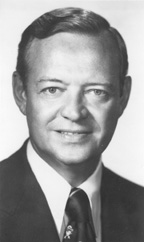 James T. Broyhill James T. Broyhill |
Republican | July 14, 1986 – November 4, 1986 |
Appointed to continue East's term Lost election to finish East's term |
||
| 29 |  Terry Sanford Terry SanfordTerry Sanford James Terry Sanford was a United States politician and educator from North Carolina. A member of the Democratic Party, Sanford was the 65th Governor of North Carolina , a two-time U.S. Presidential candidate in the 1970s and a U.S. Senator... |
Democratic | November 5, 1986 – January 3, 1993 |
99 99th United States Congress The Ninety-ninth United States Congress was a meeting of the legislative branch of the United States federal government, composed of the United States Senate and the United States House of Representatives. It met in Washington, DC from January 3, 1985 to January 3, 1987, during the fifth and sixth... (Continued) |
Elected to finish East's term | |
| 100 100th United States Congress -House of Representatives:- Senate :* President: George H.W. Bush * President pro tempore: John Stennis - Majority leadership :* Majority Leader, Democratic Conference Chairman, and Democratic Policy Committee Chairman: Robert Byrd... |
34 | Elected to full term in 1986 United States Senate election in North Carolina, 1986 The 1986 United States Senate election in North Carolina was held on November 8, 1986 as part of the nation-wide elections to the Senate. Incumbent Republican U.S... Lost re-election |
||||
| 101 101st United States Congress The One Hundred First United States Congress was a meeting of the legislative branch of the United States federal government, composed of the United States Senate and the United States House of Representatives. It met in Washington, DC from January 3, 1989 to January 3, 1991, during the first two... |
||||||
| 102 102nd United States Congress -House of Representatives:- Senate :* President:Dan Quayle * President pro tempore: Robert Byrd - Majority leadership :* Majority Leader: George Mitchell* Majority Whip: Wendell Ford- Minority leadership :... |
||||||
| 30 | Lauch Faircloth Lauch Faircloth Duncan McLauchlin "Lauch" Faircloth , served one term as a Republican U.S. Senator from North Carolina.Before his Senate service, Faircloth was a prominent and wealthy hog farmer... |
Republican | January 3, 1993 – January 3, 1999 |
103 103rd United States Congress - House of Representatives :- Leadership :- Senate :* President: Dan Quayle , until January 20, 1993** Al Gore , from January 20, 1993* President pro tempore: Robert Byrd - Majority leadership :* Majority Leader: George Mitchell... |
35 | Elected in 1992 United States Senate election in North Carolina, 1992 The 1992 United States Senate election in North Carolina was held on 3 November 1992 as part of the nation-wide elections to the Senate. Incumbent Democrat Terry Sanford lost re-election to a second term to Republican Lauch Faircloth.-Republican:... Lost re-election |
| 104 104th United States Congress The One Hundred Fourth United States Congress was a meeting of the legislative branch of the United States federal government, composed of the United States Senate and the United States House of Representatives. It met in Washington, DC from January 3, 1995 to January 3, 1997, during the third and... |
||||||
| 105 105th United States Congress The One Hundred Fifth United States Congress was a meeting of the legislative branch of the United States federal government, composed of the United States Senate and the United States House of Representatives. It met in Washington, DC from January 3, 1997 to January 3, 1999, during the fifth and... |
||||||
| 31 | 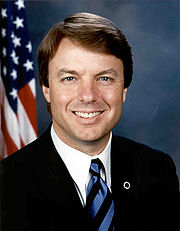 John Edwards John EdwardsJohn Edwards Johnny Reid "John" Edwards is an American politician, who served as a U.S. Senator from North Carolina. He was the Democratic nominee for Vice President in 2004, and was a candidate for the Democratic presidential nomination in 2004 and 2008.He defeated incumbent Republican Lauch Faircloth in... |
Democratic | January 3, 1999 – January 3, 2005 |
106 106th United States Congress The One Hundred Sixth United States Congress was a meeting of the legislative branch of the United States federal government, composed of the United States Senate and the United States House of Representatives. It met in Washington, DC from January 3, 1999 to January 3, 2001, during the last two... |
36 | Elected in 1998 United States Senate election in North Carolina, 1998 The 1998 United States Senate election in North Carolina was held on November 3, 1998. Incumbent Republican U.S. Senator Lauch Faircloth decided to seek re-election to a second term, but was defeated by Democrat John Edwards.- Campaign :... Retired to run for U.S. President |
| 107 107th United States Congress The One Hundred Seventh United States Congress was a meeting of the legislative branch of the United States federal government, composed of the United States Senate and the United States House of Representatives. It met in Washington, D.C. from January 3, 2001 to January 3, 2003, during the final... |
||||||
| 108 108th United States Congress The One Hundred Eighth United States Congress was the legislative branch of the United States federal government, composed of the United States Senate and the United States House of Representatives from January 3, 2003 to January 3, 2005, during the third and fourth years of George W. Bush's... |
||||||
| 32 |  Richard Burr Richard BurrRichard Burr Richard Mauze Burr is the senior United States Senator from North Carolina and a member of the Republican Party. Previously, Burr represented North Carolina's 5th congressional district in the United States House of Representatives.... |
Republican | January 3, 2005 – Present |
109 109th United States Congress The One Hundred Ninth United States Congress was the legislative branch of the United States, composed of the United States Senate and the United States House of Representatives, from January 3, 2005 to January 3, 2007, during the fifth and sixth years of George W. Bush's presidency. House members... |
37 | Elected in 2004 United States Senate election in North Carolina, 2004 The 2004 United States Senate election in North Carolina was held on November 2, 2004. Incumbent Democratic U.S. Senator John Edwards decided to retire from the Senate, ran unsuccessfully for the 2004 Democratic Party presidential nomination, and became his party's vice presidential nominee... |
| 110 110th United States Congress The One Hundred Tenth United States Congress was the meeting of the legislative branch of the United States federal government, between January 3, 2007, and January 3, 2009, during the last two years of the second term of President George W. Bush. It was composed of the Senate and the House of... |
||||||
| 111 111th United States Congress The One Hundred Eleventh United States Congress was the meeting of the legislative branch of the United States federal government from January 3, 2009 until January 3, 2011. It began during the last two weeks of the George W. Bush administration, with the remainder spanning the first two years of... |
||||||
| 112 112th United States Congress The One Hundred Twelfth United States Congress is the current meeting of the legislative branch of the United States federal government, composed of the United States Senate and the United States House of Representatives. It convened in Washington, D.C. on January 3, 2011, and will end on January... |
38 | Re-elected in 2010 United States Senate election in North Carolina, 2010 The 2010 United States Senate election in North Carolina was held on November 2, 2010. The filing deadline for the primaries was February 26; the primaries were held on May 4, with a Democratic primary runoff held on June 22. Incumbent Republican U.S. Senator Richard Burr won re-election to a... |
||||
| 113 113th United States Congress The One Hundred Thirteenth United States Congress will be the next meeting of the legislative branch of the United States federal government after the 112th Congress is seated. It will be composed of the United States Senate and the United States House of Representatives. It is scheduled to meet... |
||||||
| 114 | ||||||
See also
- United States congressional delegations from North CarolinaUnited States Congressional Delegations from North CarolinaThese are tables of congressional delegations from North Carolina to the United States Senate and United States House of Representatives.-United States Senate:-House of Representatives:-Key:...
- List of United States Representatives from North Carolina

